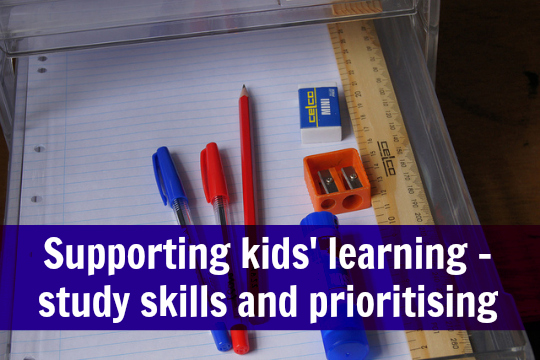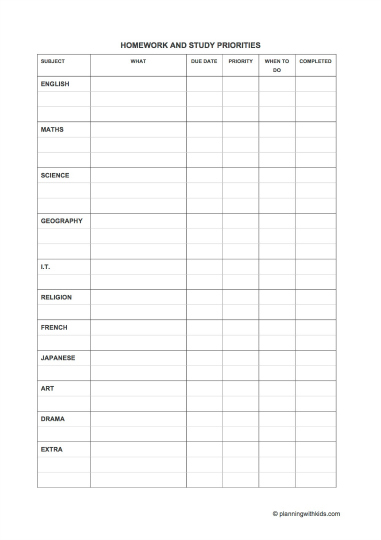This week on the blog I will be featuring posts on the theme of supporting kids’ learning. Once you have kids in school it is often difficult to know:
- how much to help
- what help to give
- and if you are teaching them the right things!
I have a couple of fab guest posts lined up as I am not a teacher, nor am I an educational expert. What I will offer up is how I help support my kids at home with their learning.
I have written previously on this topic, so if you are new to the blog you might like to read these first:
- 10 Homework Tips For Parents
- Learnings From The First Year Of School
- Active studying strategies for teenagers
- Homework Help – Managing It With Multiple Kids
Study skills
As the kids grow older you certainly have less to do with their homework. My main aim with the two secondary school kids is to help them learn study skills and organisational skills that help them effectively complete their homework and study commitments.
As noted back in 2012, Teaching Study Skills while they do some work at school with the kids to teach them how to make study notes, I really needed to spend some time with son teaching him study skills for exams as he didn’t really know how to approach them.
It is the simple things that as an adult you can just assume they know and form the basis for taking good study notes:
- Dot points – do not write in paragraphs! Dot points are best and the shorter the better.
- Key points – focus on key words and definitions.
- Simplify – can it be made into a timeline? a table? a chart? Try and make it visually simple, so you can use the image to help with recall.
- Colour code – use different colour pens or highlighters consistently throughout your notes. Eg all dates in red, info you know will be tested highlighted in yellow, etc.
- Use your own words – you are more likely to remember information when the terminology is something you would actually use and you understand it.
Prioritising homework
Knowing what to do when is also a learned process for some kids. Some kids will naturally organise their homework and study load in their head and set about doing it, but for my boys I have found teaching them some prioritisation skills has been beneficial for them keeping on top of the work they have.
The step up in homework from his primary school to secondary school was significant for our year seven son and in the early weeks, I could see a level of stress building about the work load and how to get it all done.
One weekend we wrote up a list of all his subjects and any requirements he had for the upcoming week. Even though this information was written in his diary, you could almost instantly see his stress levels decreasing as he laid his work load out in a table format.
I then asked him to go through and prioritise them with numbers. He then thought it would be good to write what day of the weekend he would complete the work. Once he had done this he seemed much more confident about what he should do and when.
The act of creating an organised list of his homework worked for him as it broke down a lot of work into a series of tangible tasks. I loved that after he created the list, he immediately worked out that although his maths homework was priority one, he was feeling quite tired and thought he would be better to do that in the morning when he was fresh. So he took a lower priority task – ruling up his diary to finish his homework tasks for the evening.
We then turned our handwritten table into a word doc so he could use it regularly as a homework planner. You can download a copy of it by clicking here (it will open in word). I have left it as a word doc so you change the subjects and other info to suit your needs.
How have you helped your kids with study skills and prioritising their homework?
***********
When I usually run a series, I will post on the topic once a week for about four weeks. This time, I am trying something different and will post on this topic for five consecutive days. I would love your feedback at the end of the series (I will ask again at the end!) on which format you prefer. Thanks in advance for your help with this.


